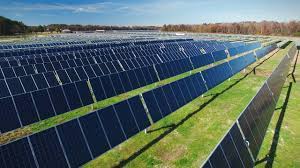
By Randy Arrington
LURAY, March 31 — Several issues surrounding the potential for solar farms in Page County seem to be waiting on a single subcommittee to offer changes to a proposed solar ordinance before any plans can move forward.
Richmond-based Urban Grid submitted a new proposal to develop a large-scale solar farm in the county on Dec. 11, 2020. However, at the direction of the county attorney, the application has remained on the shelf since Urban Grid paid $950 to file a special use permit application almost four months ago.
“I have received it. It’s sitting on my desk, but it has not been reviewed by staff. I would have to review it to make it a completed application,” Page County Director of Planning and Community Development Tracy Clatterbuck said earlier this month. “I have been advised to sit on it.”
While she has “not thoroughly gone through it,” Clatterbuck noted that the acreage and tax map numbers in the new application match the special use permit that Urban Grid submitted more than two years ago for the Cape Solar project. The project called for a 100-megawatt, utility-scale solar farm on a 559-acre parcel just north of Luray. The permit was ultimately voted down in a tie 3-3 vote by the Page County Board of Supervisors almost two years ago.
A second project proposed by Urban Grid, Dogwood Solar, received 4-2 approval by the board two years ago this Friday. The 20-megawatt solar farm was approved for a 340-acre site along Dam Acres Road near Stanley. However, despite the approval, a moratorium was placed on the approval until the county could construct a solar ordinance to guide future applications. No construction has taken place at the site, which would require the completion of a permit process through the Virginia Department of Environmental Quality.
The Page County Planning Commission recommended denial of both Urban Grid projects by a 6-4 vote in 2019. After the Cape Solar project was denied, the board of supervisors tasked the planning commission (and subsequently a subcommittee of that group) with creating a solar ordinance for the county. That two-year process, with consulting help from the Berkley Group, ended near the close of 2020. Then, after delaying a vote to February, the supervisors voted 4-2 to not accept the proposed ordinance — or more specifically the 200-acre limit on utility-scale solar facilities.
Several supervisors clearly wanted to increase the acreage limit, so a subcommittee of two supervisors and county staff was formed in February to work out amendments to the proposed ordinance. Supervisor Allen Louderback (Dist. 2) was chosen to represent the side supporting the solar ordinance that the planning commission had recommended by a 9-1 vote. Supervisor Jeff Vaughan (Dist. 5) represents the side supporting increasing the allowable size of utility-scale solar facilities.
The new subcommittee has only met twice, but the process has been delayed as supervisors and staff sort through the budget season, which includes numerous meetings. Until the subcommittee comes back to the full board with recommendations, the solar ordinance issue remains idle. Under the rules of procedure, a supervisor who voted against the proposed ordinance must now bring it back before the board. The approval of a solar ordinance would potentially lift the moratorium on the Dogwood Solar project and begin the review of Cape Solar’s second special use permit application.
It will likely be after the county formally adopts its FY22 budget in early May before any serious focus swings back to the controversial solar ordinance.
•••
RELATED ARTICLES
Supervisors keep orbiting solar ordinance, but can’t land on agreement amid accusations




Be the first to comment